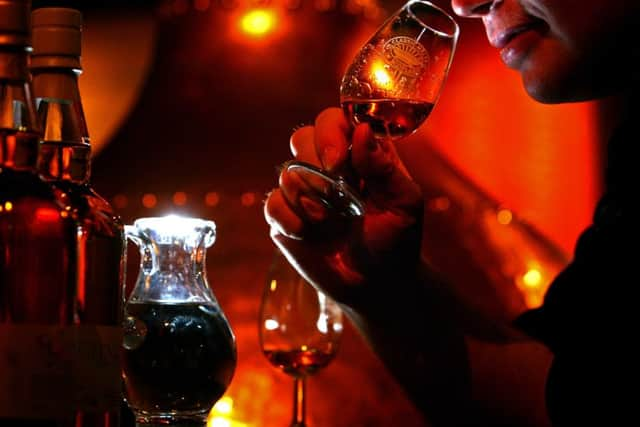Scottish Tories stake reputation on whisky duty freeze
Fears that the Chancellor is preparing a 3.4 per cent hike to spirit duty after a freeze last year have sparked a cross-party campaign to protect hundreds of millions of pounds worth of investment in an industry that directly employs around 10,000 people in Scotland.
The Scottish Conservatives in particular have made keeping the freeze on spirits duty their top demand for the budget, staking their ability to influence within government as a bloc of 12 backbench MPs on Philip Hammond’s decision tomorrow.
Advertisement
Hide AdAdvertisement
Hide AdHowever, while the government has sent strong signals that it will preserve the friendly tax regime for another key Scottish industry – North Sea oil and gas – there have been few public clues about the Chancellor’s thinking on alcohol taxes.


The Scotch Whisky Association (SWA) estimates that producers have pumped £500 million worth of capital investment into the industry over the past 18 months.
Last year saw 18 new distilleries opened in Scotland, and this summer saw the unveiling of a £140m new Macallan distillery and visitor centre near Craigellachie in Speyside.
Historic distilleries have been brought back into production at Brora and Port Ellen, and brand new whiskies are now being produced on Raasay and in the Borders.
MPs from all four parties representing Scotland at Westminster have lent their support to a high-profile campaign led by the SWA, lobbying the Chancellor in public and in private, and taking part in video messages on social media.
Asked whether the industry would be protected during Prime Minister’s Questions this week, Theresa May hailed “robust” efforts by Scottish Conservative MPs but failed to give any assurances.
“We were pleased to be able to take the stance that we did on [freezing] the duty [last year], because we recognise the importance of Scotch whisky to the UK,” the Prime Minister said. “This is an important industry.”
The SNP have warned that an increase in duty would “deliver an economic body blow” to the industry, and Lib Dem and Labour MPs have backed a continued freeze.
Advertisement
Hide AdAdvertisement
Hide AdMoray MP Douglas Ross said whisky distilleries were a “vital employer” in his area and brought a “huge boost in tourism” to Speyside.
“Scotch whisky is world renowned and an export powerhouse,” Ross said.
“The thriving industry brings many economic benefits to rural communities, not just in Moray but the whole of Scotland.
“Thanks to the Conservative spirit duty freeze in previous years it has only gone from strength to strength. My Scottish Conservatives colleagues are determined to see this continue.”
While much of the focus is on whisky’s growth potential as an export, the UK remains the fourth biggest market for Scotch in the world.
Between 2007 and 2014, when the automatic alcohol duty escalator raised excise on spirits by 44 per cent, the volume of whisky released for sale in the UK dropped by nearly a fifth, from 102 million 70cl bottles to 83 million.
Since 2014, duty has only risen by 1.4 per cent and UK volumes have picked up, to 86 million 70cl bottles released for sale last year.
Industry insiders say a return to rising spirit duties would hit investment that supports 7,000 rural jobs in Scotland and more than 40,000 across the UK.
Advertisement
Hide AdAdvertisement
Hide AdGraeme Littlejohn, deputy director at the SWA, said the spirit duty escalator had been “hugely damaging” to the industry and called on the Chancellor to keep tax levels stable.
“It is only over the last five years that we have seen the domestic market stabilize, in large part due to the more positive duty policy we have seen since 2014,” Littlejohn said. “It would be a mistake for the Chancellor to return to raising duty on Scotch. There would undoubtedly be a strong reaction from the industry, which the Prime Minister described only this week as important to the UK.
“The Chancellor should continue the freeze on spirits duty he put in place just last year, which actually increased government revenue from spirits by 9 per cent and supported an industry which provides jobs and investment in communities up and down the country.”
Charles Ireland, the general manager for Great Britain, Ireland and France at Diageo, whose Scotch whisky brands include Bell’s and Johnnie Walker as well as single malt distilleries including Oban, Dalwhinnie and Lagavulin, said the freeze was essential to ensuring continued investment in production.
“Currently 74 per cent of the total cost of a bottle of Scotch is tax and British drinkers pay over 40 per cent of all the alcohol duty collected in the whole of the EU, despite only making up 16 per cent of the population,” Ireland said.
“Tomorrow’s Budget is an opportunity for the Chancellor to address these issues by implementing a freeze, providing producers with certainty and encouraging further investment.”